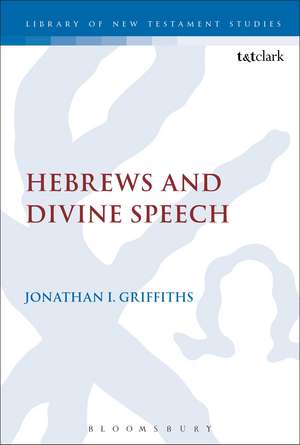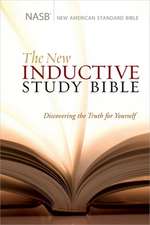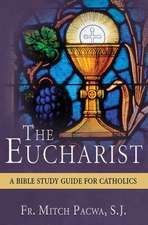Hebrews and Divine Speech: The Library of New Testament Studies
Autor Dr Jonathan I. Griffithsen Limba Engleză Paperback – 24 feb 2016
| Toate formatele și edițiile | Preț | Express |
|---|---|---|
| Paperback (1) | 256.49 lei 6-8 săpt. | |
| Bloomsbury Publishing – 24 feb 2016 | 256.49 lei 6-8 săpt. | |
| Hardback (1) | 772.98 lei 6-8 săpt. | |
| Bloomsbury Publishing – 27 aug 2014 | 772.98 lei 6-8 săpt. |
Din seria The Library of New Testament Studies
- 34%
 Preț: 509.52 lei
Preț: 509.52 lei - 22%
 Preț: 832.58 lei
Preț: 832.58 lei - 22%
 Preț: 832.09 lei
Preț: 832.09 lei - 24%
 Preț: 190.33 lei
Preț: 190.33 lei - 22%
 Preț: 832.65 lei
Preț: 832.65 lei - 23%
 Preț: 191.31 lei
Preț: 191.31 lei -
 Preț: 221.70 lei
Preț: 221.70 lei -
 Preț: 98.92 lei
Preț: 98.92 lei - 31%
 Preț: 830.87 lei
Preț: 830.87 lei - 22%
 Preț: 834.60 lei
Preț: 834.60 lei - 22%
 Preț: 831.59 lei
Preț: 831.59 lei - 30%
 Preț: 717.05 lei
Preț: 717.05 lei - 22%
 Preț: 835.03 lei
Preț: 835.03 lei - 30%
 Preț: 511.40 lei
Preț: 511.40 lei - 24%
 Preț: 190.33 lei
Preț: 190.33 lei -
 Preț: 158.77 lei
Preț: 158.77 lei - 30%
 Preț: 510.04 lei
Preț: 510.04 lei - 22%
 Preț: 832.99 lei
Preț: 832.99 lei - 30%
 Preț: 509.52 lei
Preț: 509.52 lei - 22%
 Preț: 832.80 lei
Preț: 832.80 lei - 22%
 Preț: 831.76 lei
Preț: 831.76 lei - 22%
 Preț: 834.93 lei
Preț: 834.93 lei - 22%
 Preț: 831.59 lei
Preț: 831.59 lei - 22%
 Preț: 832.41 lei
Preț: 832.41 lei - 22%
 Preț: 832.99 lei
Preț: 832.99 lei -
 Preț: 414.71 lei
Preț: 414.71 lei - 30%
 Preț: 773.65 lei
Preț: 773.65 lei - 22%
 Preț: 834.93 lei
Preț: 834.93 lei - 14%
 Preț: 511.81 lei
Preț: 511.81 lei -
 Preț: 222.16 lei
Preț: 222.16 lei - 30%
 Preț: 775.67 lei
Preț: 775.67 lei - 30%
 Preț: 1012.49 lei
Preț: 1012.49 lei - 30%
 Preț: 509.02 lei
Preț: 509.02 lei - 30%
 Preț: 656.90 lei
Preț: 656.90 lei -
 Preț: 469.92 lei
Preț: 469.92 lei -
 Preț: 471.68 lei
Preț: 471.68 lei -
 Preț: 173.21 lei
Preț: 173.21 lei - 30%
 Preț: 833.64 lei
Preț: 833.64 lei - 22%
 Preț: 834.93 lei
Preț: 834.93 lei - 31%
 Preț: 772.17 lei
Preț: 772.17 lei - 30%
 Preț: 774.20 lei
Preț: 774.20 lei - 14%
 Preț: 1124.92 lei
Preț: 1124.92 lei - 22%
 Preț: 948.51 lei
Preț: 948.51 lei - 14%
 Preț: 1128.84 lei
Preț: 1128.84 lei - 31%
 Preț: 1065.91 lei
Preț: 1065.91 lei - 22%
 Preț: 777.71 lei
Preț: 777.71 lei - 31%
 Preț: 1064.84 lei
Preț: 1064.84 lei - 22%
 Preț: 1063.44 lei
Preț: 1063.44 lei - 22%
 Preț: 889.49 lei
Preț: 889.49 lei - 22%
 Preț: 1006.06 lei
Preț: 1006.06 lei
Preț: 256.49 lei
Nou
Puncte Express: 385
Preț estimativ în valută:
49.08€ • 51.35$ • 40.77£
49.08€ • 51.35$ • 40.77£
Carte tipărită la comandă
Livrare economică 03-17 aprilie
Preluare comenzi: 021 569.72.76
Specificații
ISBN-13: 9780567667465
ISBN-10: 0567667464
Pagini: 216
Dimensiuni: 156 x 234 x 12 mm
Greutate: 0.31 kg
Ediția:NIPPOD
Editura: Bloomsbury Publishing
Colecția T&T Clark
Seria The Library of New Testament Studies
Locul publicării:London, United Kingdom
ISBN-10: 0567667464
Pagini: 216
Dimensiuni: 156 x 234 x 12 mm
Greutate: 0.31 kg
Ediția:NIPPOD
Editura: Bloomsbury Publishing
Colecția T&T Clark
Seria The Library of New Testament Studies
Locul publicării:London, United Kingdom
Caracteristici
Provides sustained support for the view that a logos Christology operates in Hebrews, serving to locate Hebrews within developments in early Christology
Notă biografică
Jonathan I. Griffiths read theology at Oxford, UK and completed his New Testament PhD at Cambridge, UK. He is editor of The Perfect Saviour: Key Themes in Hebrews (2012) and is a Tutor on the PT Cornhill Training Course, UK.
Cuprins
Table of Contents Acknowledgments page Abbreviations1. Introduction Excursus 1: A Contribution to the Structure Debate 2. Hebrews 1.1-4: God's Speech 'in' his Son 3. Hebrews 2.1-4: God's Spoken Salvation Excursus 2: The Term 'Logos' and its Connection to Word Personalisations in Other Ancient Literature 4. Hebrews 4.2-16: God's Living Word 5. Hebrews 5.11-6.12: God's Word, its Forms and Expected Effect 6. Hebrews 6.13-7.28: The Spoken and Effective Oath 7. Hebrews 11.3: God's Word of Creation 8. Hebrews 12.18-29: The Saving and Judging Word from Zion 9. Hebrews 13: God's Word and the Community's Leaders 10. Conclusion BibliographyIndex
Recenzii
This is a fine work of scholarship that fronts and examines a major emphasis of Hebrews and a crucial theme for theology. Hebrews is indubitably a discourse that centers on God's saving speech-that is, his speech in and as the Son, in the form of the promise delivered in the word of the proclaimed gospel (1:1-4; 4:12-13; 12:25-29). Yet this broad affirmation requires testing and refinement, which is what Griffiths pursues. His successive, close examinations of 1:1-4; 2:1-4; 4:2-16; 5:11-6:12; 6:13-7:28; 11:3; 12:18-29; and 13:7, 17, 22 are necessary reading for all exegetes.








